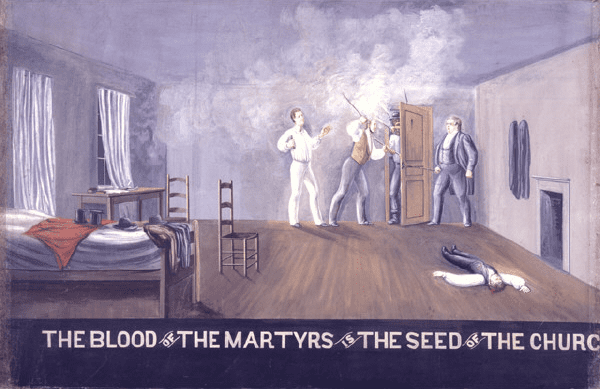
***
I had intended to write an extensive post on Sunday regarding the martyrdom of the Prophet Joseph Smith and his older brother, the Patriarch Hyrum Smith. Sunday marked the 177th anniversary of that horrific event. Alas, though, the day simply got away from me and I didn’t have time.
But here are a quartet of items on the subject that you might belatedly find of at least some interest. The first of them was published two years ago in the Church News:
“A timeline of the 96-hour period surrounding the martyrdom of Joseph Smith and Hyrum Smith”
“Joseph Smith’s qualification as a martyr”
And it really wouldn’t hurt, even belatedly, to read the tribute written by Elder John Taylor, the British-born apostle and future third president of the Church of Jesus Christ who was seriously wounded in the same mob attack at Carthage, Illinois, that took the lives of Joseph and Hyrum:
https://www.churchofjesuschrist.org/study/scriptures/dc-testament/dc/135?lang=eng
And I would recommend, as well, revisiting this marvelous and marvelously powerful October 2009 General Conference address from Elder Jeffrey R. Holland:
Finally, with apologies for sounding a bit like a broken record, I suggest a viewing of the film Witnesses. And seeing Witnesses will be especially appropriate on Monday, 28 June — which is, very probably, the 192nd anniversary of the experience of the Three Witnesses with the plates, the angel, and the testifying voice of God.
***
I’ve always been struck by the fact that Hyrum Smith was very nearly five years older than his brother Joseph, combined with the fact of Hyrum’s complete loyalty to his little brother and his utter faith in Joseph’s calling. I think it extremely unlikely that an older brother would be so trusting toward a younger brother — eventually willing to go to very probable death with him (and, as it turned out, to actual death with him) — if he knew that younger brother to be a teller of tall tales or if he even suspected him of being such.
I’m reminded in this context of William Smith’s 1875 recollection:
There was not a single member of the family of sufficient age to know right from wrong, but what had implicit confidence in the statements made by my brother Joseph concerning his vision and the knowledge he thereby obtained concerning the plates. Father and mother believed him; why should not the children? I suppose if he had told crooked stories about other things, we might have doubted his word about the plates, but Joseph was a truthful boy. That father and mother believed his report and suffered persecution for that belief shows that he was truthful.
Or, as William put the same point in 1884:
All believed it was true, father, mother, brothers and sisters. You can tell what a child is. Parents know whether their children are truthful or not. . . . Father knew his child was telling the truth.
But back to Hyrum, in particular. In December 1839, Hyrum had written of his sufferings in Missouri, where he had been arrested in the fall of 1838 and then imprisoned in the ironically named Liberty Jail from early December to April:
I had been abused and thrust into a dungeon, and confined for months on account of my faith, and the ‘testimony of Jesus Christ.’ However I thank God that I felt a determination to die rather than deny the things which my eyes had seen, which my hands had handled, and which I had borne testimony to, wherever my lot had been cast. And I can assure my beloved brethren that I was enabled to bear as strong a testimony, when nothing but death presented itself, as ever I did in my life.
Brave words after the fact, a cynical critic might sneer. But they weren’t empty words, as Hyrum made indisputably clear when, with what seems to have been full awareness, he willingly went to Carthage, Illinois, and to its fatal jail, in company with his brother.
On 27 June 1844, Hyrum Smith sealed his testimony at Carthage Jail with his blood. (Significantly, the Greek word martyr means “witness.”) On the morning Hyrum left for Carthage, he expected to die. And, with that expectation, he turned for comfort to Ether 12:36-38 in the Book of Mormon, which states:
And it came to pass that I prayed unto the Lord that he would give unto the Gentiles grace, that they might have charity. And it came to pass that the Lord said unto me: If they have not charity it mattereth not unto thee, thou hast been faithful; wherefore thy garments are clean. And because thou hast seen thy weakness, thou shalt be made strong, even unto the sitting down in the place which I have prepared in the mansions of my Father. And now I . . . bid farewell unto the Gentiles; yea, and also unto my brethren whom I love, until we shall meet before the judgment-seat of Christ, where all men shall know that my garments are not spotted with your blood.
According to those who were in the prison with Joseph and Hyrum just before their martyrdom, “During the evening the Patriarch Hyrum Smith read and commented upon extracts from the Book of Mormon, on the imprisonments and deliverance of the servants of God for the Gospel’s sake. Joseph bore a powerful testimony to the guards of the divine authenticity of the Book of Mormon, the restoration of the Gospel, the administration of angels, and that the kingdom of God was again established upon the earth.”
On the morning of their murder, June 27, 1844, “Both Joseph and Hyrum bore a faithful testimony to the Latter-day work, and the coming forth of the Book of Mormon.”
Before sunset that evening, the mob had done its work. “The testators are now dead,” wrote John Taylor, announcing their martyrdom, “and their testament is in force.”
***
And here is a nice collection of items from the Christopher Hitchens Memorial “How Religion Poisons Everything” File©:











